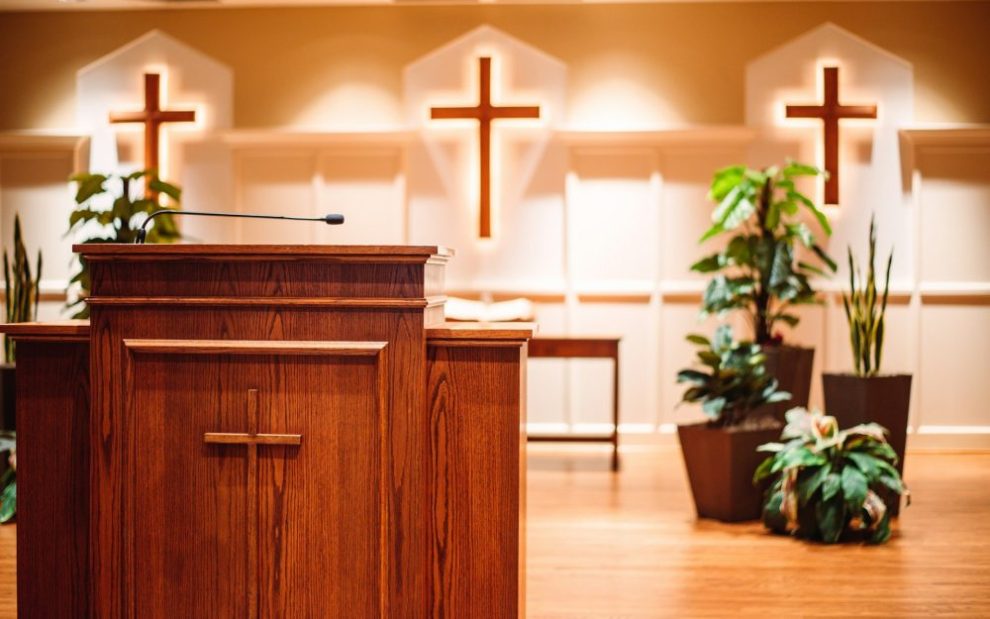“Mama, it’s a woman!”
These words were uttered with wide-eyed excitement by 7-year-old Lucy Rau when she heard a gospel reflection at Immaculate Conception Catholic Church in Durham, North Carolina. The woman preacher was Jeanne Bernacki, a Catholic school campus minister with many years of ministry experience.
“I asked her how it made her feel,” Lucy’s mother, Hilary Rau, recalls. “She thought for a minute and said, ‘Happy. And hopeful that things can be fairer.’ ”
Hilary and Lucy are two of countless people who have felt encouraged, engaged, and energized after experiencing lay liturgical preaching. Girls and women, who make up more than 50 percent of the people in the pews, rarely hear the Word broken open by people like them.
However, in September 2023, thanks to St. Phoebe celebrations organized by the nonprofit project Discerning Deacons, thousands of Catholics experienced women offering reflections or witness talks. The celebrations, intentionally held in anticipation of the global synod assembly, occurred around the United States and in several other countries. The celebrations further energized conversations about the need for spaces for skilled, faithful, non-ordained Catholics, especially women, to exercise their gifts.
The document “Enlarge the Space of Your Tent,” which synthesizes input offered by Catholics during the first stage of the synod, includes five paragraphs under the heading “Rethinking Women’s Participation.” According to the document, the “role of women and their vocation” is a “critical and urgent area. . . . From all continents comes an appeal for Catholic women to be valued first and foremost as baptized and equal members of the People of God . . . many reports ask that the church continue its discernment in relation to a range of specific questions: the active role of women in governing structures of church bodies, the possibility for women with adequate training to preach in parish settings, and a female diaconate.”
Given the “critical and urgent” nature of questions around women and vocation, it is not surprising that expanding opportunities to preach emerged in the synod synthesis report, “A Synodal Church in Mission.” The document states, “One can think of further expanding responsibilities assigned to the existing ministry of lector, responsibilities that are already broader than those performed in the liturgy. This could become a fuller ministry of the Word of God, which, in appropriate contexts, could also include preaching.”
While this might sound like a big departure from what many Catholics are used to, it’s important to note provisions for lay preaching already exist. According to the U.S. Conference of Catholic Bishops’ implementation of canon law (called complementary norms), “The lay faithful can be called to cooperate in the exercise of the Ministry of the Word.” The USCCB goes on to state that the “diocesan bishop can admit lay faithful to preach . . . when he judges it to be to the spiritual advantage of the faithful.”
The proposed expansion of the lector’s role opens the door for women and other laypeople to exercise preaching gifts. This could revitalize Catholics’ experience of liturgy and be “to the spiritual advantage of the faithful” in significant ways.
While the proposal on lay preaching has not generated as much conversation as other sections of the synthesis document, it was highlighted by Austen Ivereigh, a British Catholic journalist who was present at the synod assembly as a “non-voting expert.” Ivereigh was one of four panelists who participated in a November 13, 2023 post-synod debrief conversation at Catholic Theological Union in Chicago.
“It’s talking here about men, women, laypeople and so on,” he said. “How would that look in your parish? Is someone called to a preaching ministry? What might they need? What kind of platform could you give them? . . . Why not go ahead and do it, file a report, send a report to the synod and say, ‘We’ve done this,’ . . . That’s the kind of thing that the secretariat is expecting of us, and it’s quite exciting, actually.”
I agree with Ivereigh: It is quite exciting! What if our parishes took up this challenge? Many parishes have women and laypeople with degrees in ministry, theology, or scripture as well as years or even decades of ministry experience. Do these people sense a call to preaching ministry? Do they channel their gifts in other directions because they are unsure of how their interest in preaching might be received? Perhaps you are one of these people, or someone in your community comes to mind as you read this.
Of course, a simple desire to preach does not equal a ministerial call. The synod synthesis document is not inviting a preaching “free-for-all.” Canon law states that lay faithful must be “orthodox in faith, and well-qualified, both by the witness of their lives as Christians and by preparation for preaching appropriate to the circumstances.” Training and discernment is needed; it is well worth investing time and energy into this training and discernment to strengthen the people of God.
According to canon lawyer and Passionist Sister Elissa Rinere, in the early church, “preachers preached because they received a gift from the Spirit, which was then recognized by the community, accepted, and exercised for the benefit of all. The authorization to preach came from the Spirit of God and from the community.” Lay preaching that draws from the riches of God-given gifts present in a community is an ancient practice. Revitalizing lay preaching today reinforces the centrality of baptism as authorization for ministry and lightens the load of overworked ordained ministers. More importantly, it honors and responds to the hungers of laypeople who have discerned the preaching charism and long to exercise these gifts out of love for God and their communities.
We would do well to consider Ivereigh’s invitation to respond to the synthesis document by thoughtfully and prayerfully exploring lay preaching. A first step might be initiating a conversation with the laypeople in our communities who might be drawn to preaching. Perhaps they could offer, with guidance and support, lay-led preached vespers, a preached morning of reflection, or a gospel reflection outside of the homily at Mass.
Experiences of lay preaching can break the cycle of invisibility. Laypeople who feel called to preach now have models for their preaching. As we continue on the synodal path, we are journeying toward a church where all people with preaching gifts—lay and ordained, no matter their gender—are supported, held accountable, equipped, and encouraged. Maybe someday soon girls like Lucy will no longer be amazed that “it’s a woman” because the experience will simply be a reflection of baptismal gifts, faithfully and joyfully exercised in community.
This article also appears in the April 2024 issue of U.S. Catholic (Vol. 89, No. 4, pages 11-13). Click here to subscribe to the magazine.
Image: Unsplash/Mitchell Leach












Add comment